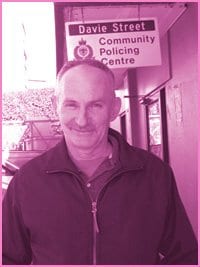“I was absolutely shocked,” says Jim Deva of the first time he ever cast a ballot in a Vancouver municipal election.
That was back in the 1970s, he says, and “I couldn’t believe the ballot. I felt that I needed a bingo marker” just to pick out a handful of candidates from the long list of names before him.
“You’d have to quit work” to seriously study each of the 40-something candidates who generally run for city hall, Deva continues. It’s a full-time job just to vote intelligently in this city’s current at-large electoral system. Granted, one could just pick all the candidates attached to a given party, he notes, but that’s not the kind of municipal politics he’d like to see. Municipal politics are supposed to be the politics of community, he sighs-they’re supposed to be more personal than that.
Deva is addressing the dozen-or-so political junkies who braved the drizzle Oct 5 to attend the Xtra West and GLBA-sponsored wards forum at the Roundhouse Community Centre.
Scattered in little clumps throughout the centre’s small theatre, the spectators listen mostly in silence as first Deva and the Yes team, and then Jamie Lee Hamilton and the No team, debate the anticipated merits and shortfalls of Vancouver switching to a ward system for municipal elections.
The Yes team’s argument can basically be boiled down to this: neighbourhoods, communities-and particularly minority communities-will be better represented under a ward system, it says.
The No team’s concerns, in contrast, centre primarily around the potential threat of NIMBYism: the idea that each ward will be dominated by people who don’t want contentious developments in their own backyards. (NIMBY stands for Not In My Backyard.)
“I don’t think drawing lines between neighbourhoods is actually a progressive step towards democratic reform,” says the No team’s Gary Mitchell, the gay Conservative candidate who unsuccessfully challenged Hedy Fry for her federal seat in June. A ward system will pit “issues against issues and people against people,” he warns.
Councillors should be working together for the city’s common interests, not looking out for their own compartments, Hamilton adds.
Wards are just going to produce increased acrimony, agrees No teammate, Colin Metcalfe. Asked to explain after the forum, Metcalfe echoes Mitchell’s NIMBYism concerns. He also suggests that voters in a ward system may feel let down by their elected representatives once they discover their expectations for responsiveness are too high.
The Yes team doesn’t buy any of it.
Every other major Canadian city has a ward system, counters Kennedy Stewart. At-large systems are fine for small communities where people can get to know their mayor and councillors personally, he says.
But under the current at-large system, citizens don’t know whom to call when they need something, former Vancouver parks board commissioner Donna Morgan says. They call the mayor’s office “because people don’t have a local politician that they know and can contact,” says the lesbian political activist.
The at-large system is undemocratic, Morgan continues. “Currently there are neighbourhoods and issues that are entirely under-represented at council.” Minority communities are particularly under-represented, she notes.
Occasionally some minorities, such as the gay community, “will have a windfall” and get some people on council, she continues, but that’s up to the whims of the parties and who they choose to nominate. And that’s not good enough.
More communities will be better represented under a ward system, Deva agrees. Wards will empower communities to solve their own problems at the neighbourhood level.
Switching to a ward system is not the full answer, Morgan notes, but it is “the first step towards improving democracy in Vancouver.”
Hamilton says she wishes she didn’t have to choose between an at-large and a ward system, since neither one satisfies her. Mitchell agrees. The current system is not perfect, he says, but wards are not the answer. “All of us care about our city very much,” he says. That’s why he’s urging people to get out and vote no in the wards plebiscite on Oct 16-to “keep this discussion open longer.”
It’s the one thing both teams can readily agree on: the importance of voting Oct 16.
Let’s change the system now while we can, says Deva.
INFOBOX:
Wards Referendum.
Oct 16, 8 am to 8 pm.
To find out where to vote:
www.pickone.ca.
604-873-7681.

 Why you can trust Xtra
Why you can trust Xtra


